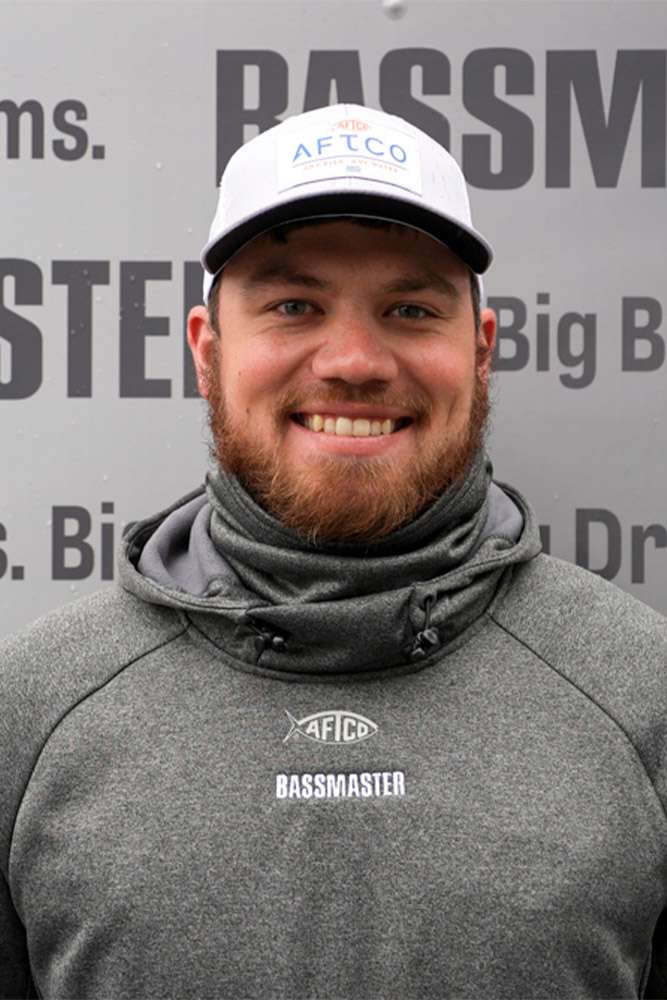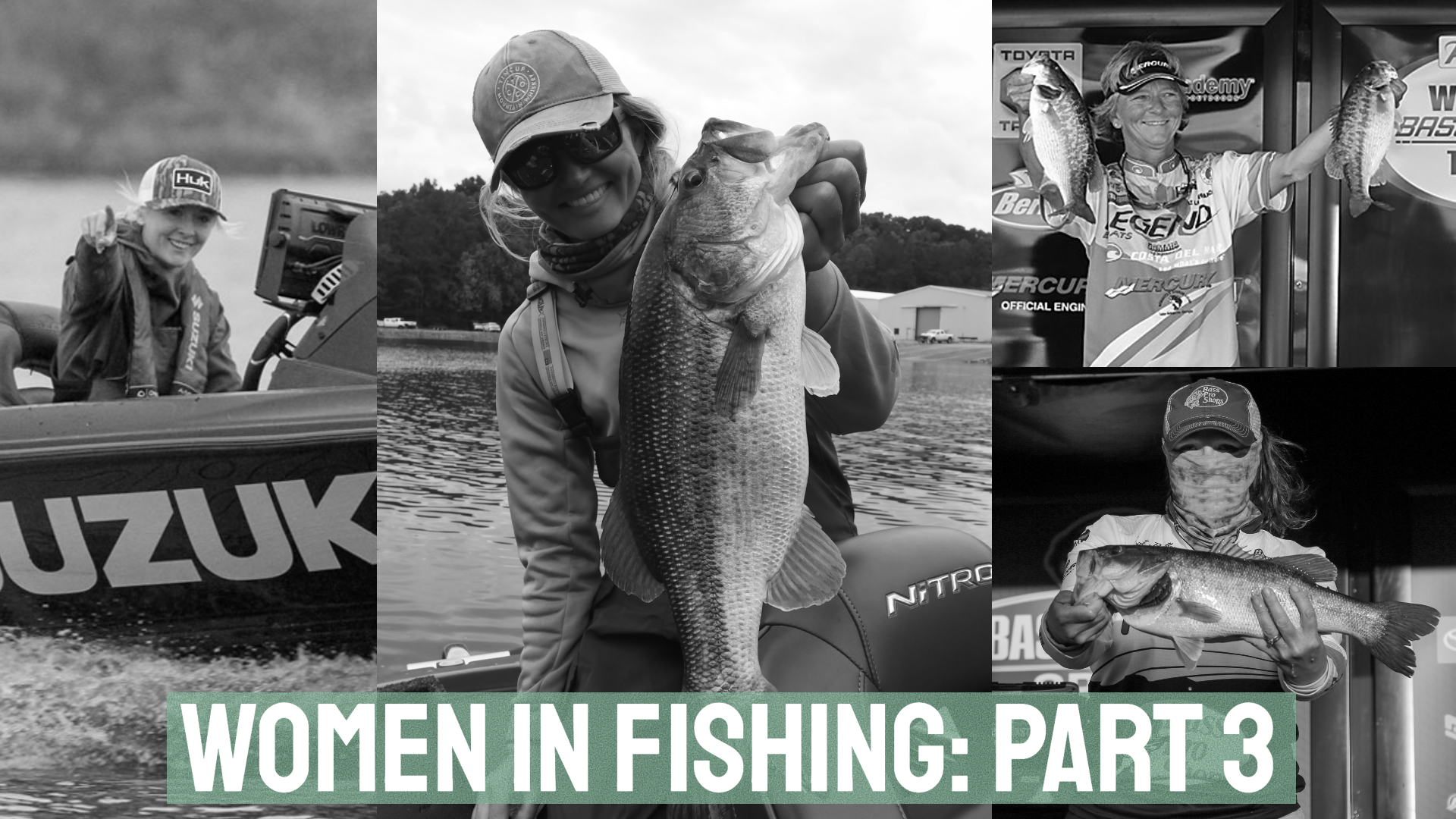
When it comes to getting more females interested in tournament fishing, ultimately Briana Tucker and Kristine Fischer both agree the best way would be for women to start winning tournaments.
“We haven’t had a woman catch them enough to compete or place high enough in the Opens (consistently),” Tucker said. “You have a lot of female anglers who are able to do well on the marketing side. But I think there is still a little bit of pushback and resentment because there hasn’t been a woman who has caught them well enough to (seriously) compete.
Women in fishing: Part 1 | Part 2 | Part 3
“When a woman has won, I think that is going to be absolutely huge when that happens. It was huge for people to get to see Anastasia (Patterson) on the cover of Bassmaster Magazine, and when someone can see that a woman beat all these men, that will be crazy.”
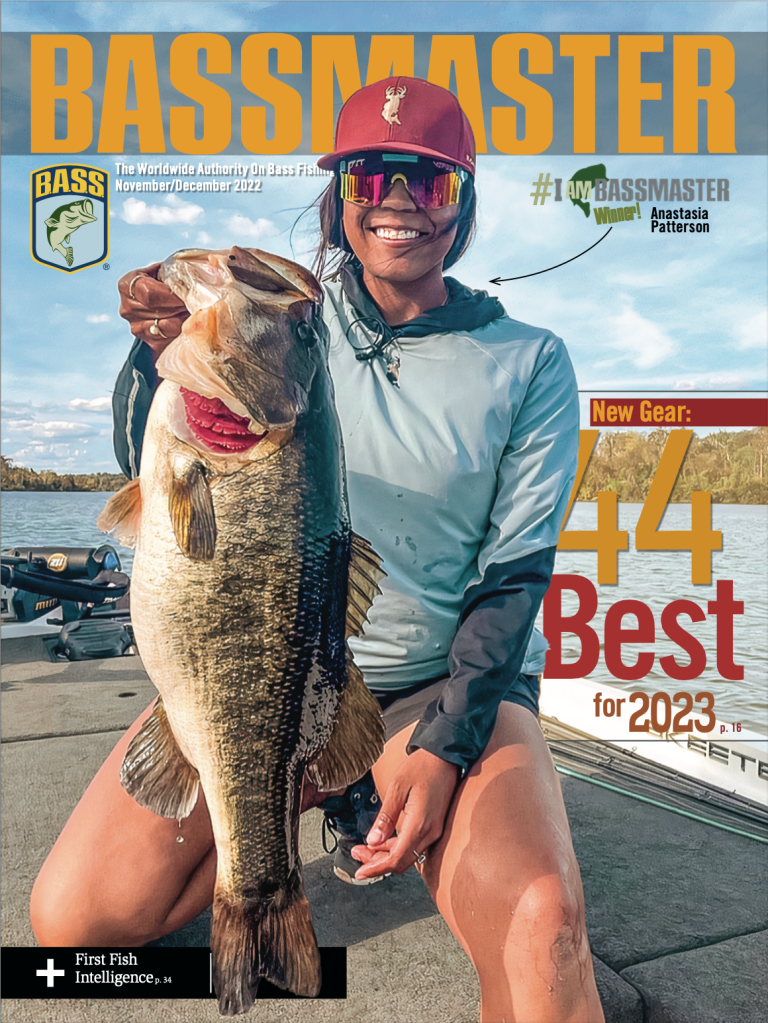
Fortunately, as far as finding sponsorship funding to compete in tournaments, the women who were interviewed for this piece all agree that there is no better time for a woman to enter the industry, potentially opening the door for more and more success.
“Over the last few years, now more than ever, if you are a female and like to fish and you are halfway decent at it, you have every opportunity and more because you are a rarity,” Fischer said. “And it kills me sometimes, there is a lot of the victim card being played and I certainly understand women have obstacles men don’t, but as far as getting financial support or product support, it has never been easier for a female.”
Christie Bradley and Fischer, among others, are living proof of this.
“One of my proudest moments in my career is, I brought GEICO into the sports,” Bradley said. “Fishing wasn’t even on their radar before I came to them and look at what GEICO has done in the sport since then. I saw the gecko dance around on the Classic stage, and that was me. You can’t argue women are bringing new sponsors into the sport.”

In recent years, more and more women have appeared in fishing-related ads. Fischer herself has represented Abu Garcia and AFTCO in television ads. Skeeter Boats and Yamaha have also featured women anglers prominently in advertising efforts.
“It’s a ‘see her, be her,’ kind of concept,” Bradley said. “It is critical. It is more important than seeing a girl in the Top 10. That is awesome too, but it isn’t always about the competition. It is about getting girls fishing.”
Take the November/December cover of Bassmaster Magazine Tucker mentioned previously, where Santee Cooper Lakes native and Strike King pro Anastasia Patterson was featured. That was the first time a woman has been featured on the cover since Pam Martin-Wells was featured in a Day on the Lake segment in April 2007.
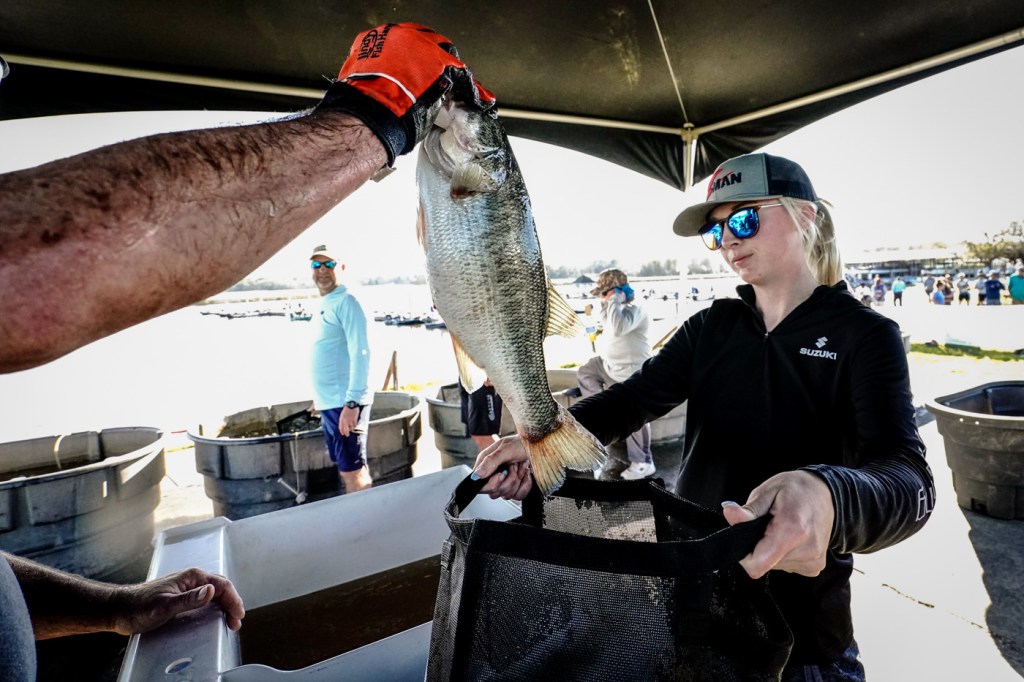
“I was so happy for Anastasia,” Tucker said. “It was a really big step in the right direction for women. I actually fished the ICAST Cup with her and we ended up getting second place on the USA Bassin’ side. For her to come off a second place and then get on the cover of Bassmaster, that was huge for her.”
Dixie Morris and fellow Helen Sevier Pioneer Scholarship recipient Elizabeth Eastman recognize that this kind of ad and print exposure is what will help grow the sport and encourage more girls to pursue fishing.
“I feel like a lot of companies need to start advertising women more,” Eastman said. “Just to show it is possible. A company like AFTCO, I have seen multiple women in their advertisements and that helps promote us (a lot).”
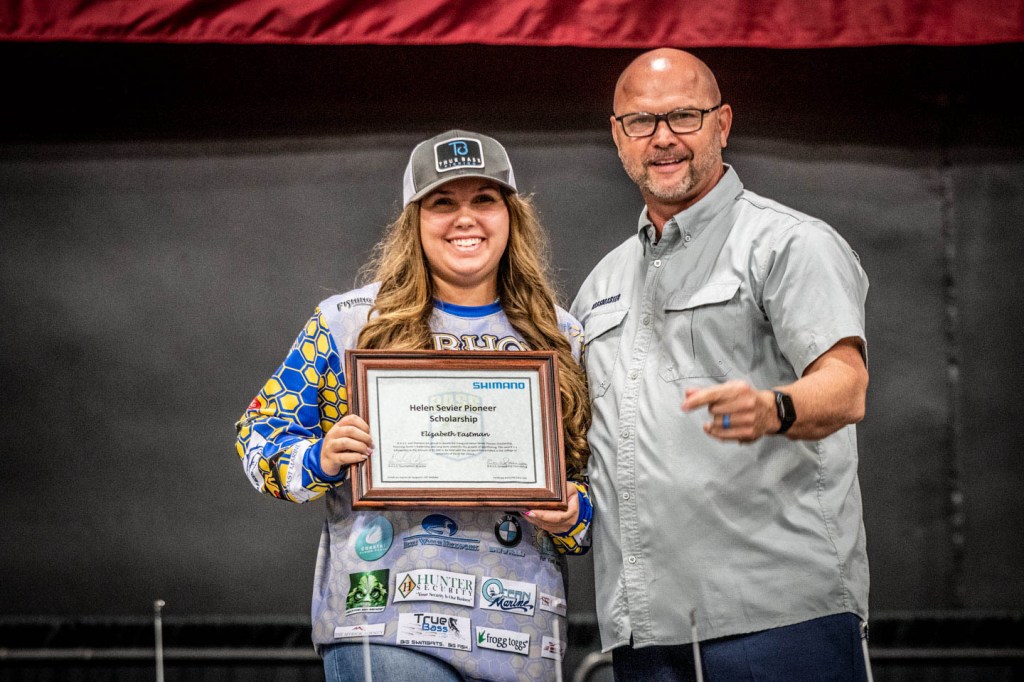
To women searching for sponsorship opportunities, Tucker warns that not all sponsors are alike. Recently, she thought she had a deal secured with a particular company. But not long after the two sides agreed to terms, she received some disappointing news.
“A few days later, they called me back and said, ‘Hey Briana, we are going to have to distance ourselves from you because a couple of our guys are really upset about us giving you this sponsorship. They don’t believe you’ve earned it. They are causing us problems and we just can’t do this. You are going to have to win an Open this year and then come back to us,’” she recalled. “That was so discouraging. I was so heartbroken. It wasn’t like I did something wrong to lose the opportunity, it was pure cutthroat. As soon as that happened to me I reached out to a couple of other female anglers and they shared that something similar has happened to them.
“You find out what companies really believe in you and which companies really believe in women.”
There are two types of companies when it comes to giving sponsorships to women: those that want serious tournament anglers and those that want “influencers.” Bradley says these influencers, sometimes scantily clad and holding either a fish or a fishing rod on various social media platforms, make things complicated for women who are trying to make it in the tournament world.
“There are some women who try to use their sexuality to get ahead and the poisonous side of that where they claim they are treated unfairly by tournament organizations and sponsors. That is setting us back and negating all of the positive things,” Bradley said. “Because of the numbers and how few of us there are, it is detrimental. There are girls who are really pretty and like fishing and there is significant money to be made in the sport. They aren’t into it as much as the hardcore angler and they think there is some niche opportunity there.
“They will get encouragement from the wrong guys and maybe they will get a sponsor or two, but it won’t last long and they will just flounder. But they will continue to make it hard for the rest of us.”
Not only does it make it more difficult for the serious female angler to find support, Tucker believes it sends the wrong message to the younger girls entering the sport. Earlier this year, she received a message from a mom of a 6-year-old girl who is starting to get interested in fishing.
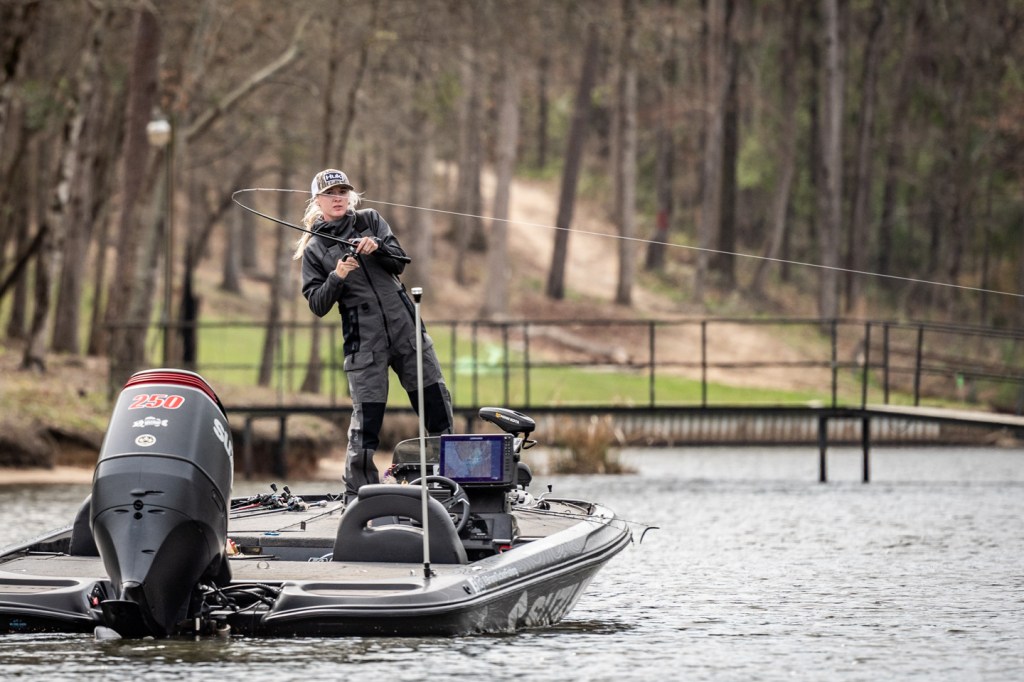
“The parents let her go on Instagram to look at fishing posts and the message said that what their 6-year-old finds is the bikini pictures and half-dressed women holding fish. She told me that it was really encouraging that there are still women out there that don’t strip down for likes,” Tucker said. “I know I miss out on opportunities by dressing the way I do and not appealing to that, and to get a message like that is encouraging. It is important for kids coming up to realize it’s not about how you dress, it is about catching the fish. With TikTok and Instagram and all of the media channels, I think it is becoming a bigger problem. When you have children who want to learn and get some encouragement and they are seeing that, they start thinking ‘Is that what I need to do to be successful?’”
Whenever Tucker talks to the younger generation, she encourages them to stay true to themselves when it comes to sponsors.
“Respect yourself as a woman, because if you respect yourself and promote yourself in a respectful way, the right people are going to support you for the right reasons,” Tucker said. “They will support you because you carry yourself well and because you catch fish.”
Despite the negativity that surrounded her first victory at Kentucky Lake, Fischer had an important realization about her role in the tournament world.
“I had a bunch of women from all over the world send messages, emails, comments and that completely changed my perspective and let me know that this is so much bigger than me,” she said. “It softened me a little with that whole ‘female thing.’ It helped me see that, just because I don’t want to be looked at as a female angler, the fact I am is cool.
“Before, I didn’t want anyone to know I was a female. I just wanted to be treated like anyone else. After that tournament, I owned it a little more and understood it was bigger than me and important for me to do what was right and try to lead women and encourage and inspire them and there was a need for it that I hadn’t seen before.”
That is part of the reason Fischer, Kayak Bass Fishing’s Amanda Brannon and Mel Isaacs began the Women’s Fishing Federation four years ago, an annual camp for women who are interested in learning more about bass fishing, particularly on the kayak side.
The first-ever event in Missouri drew 55 women from 28 different states and those numbers have stayed steady in events in La Crosse, Wis., and this past year in Texas.
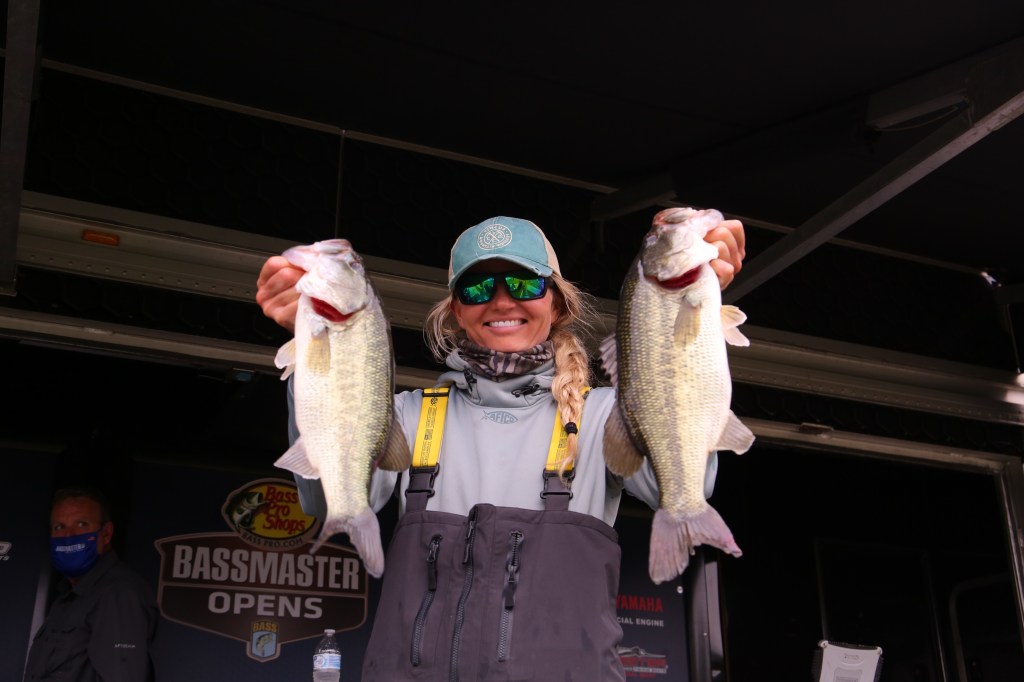
“The reason we formed it was because we were sitting there a couple years ago thinking about why we aren’t seeing more (women) competing,” Fischer said. “We did a poll and found out women were intimidated and a couple gals said they didn’t know how to unload and load the kayak by themselves and didn’t want to do it in a tournament.
“So, we were like, ‘Let’s teach them how.’ We taught classes on backing up trailers, electronics classes, technique-specific stuff. It was a life-changing experience. Seeing how many genuine women were there and seeing how badly they wanted to learn and feel like they had the capability to go out there and do it on their own, it was really cool.”
The results were immediate. Fischer said after the first Women’s Fishing Federation event, nine women signed up for the first KBF event of that season in Florida — and they were all out-of-state anglers.
“A lot of women had a really good time with it,” she said. “I think seeing and understanding that it is OK to fail. Briana and I both struggle with that. For me, I felt so much added pressure that if I failed, it would derail me.
“I’m trying to tell other women that it is OK if they don’t get a limit. You try for it, but if you are out there enjoying it and you are learning something, at the end of the day that is all that matters. You came out, fished and had a good time.”
Programs like the Women’s Fishing Federation are something Martin-Wells believes will continue to help move women into the bass tournament world.
“If there were more grassroots, women-based organizations where women could get more comfortable with things,” she said. “The biggest advantage like that nowadays is coming up through the high school ranks and they are learning the ropes of the tournament and learning about being in a boat and handling the boat. They are already taking on those challenges. If the high school coaches start at that level trying to groom them into better promoters for sponsors, then it will be a lot easier.”
Morris and Eastman were recognized in front of the full field of 2022 Bassmaster High School National Championship qualifiers, 16 of which were girls. Morris said just like Tucker has been a role model of hers, she hopes she can inspire other girls who have been looked down on to pursue their passion in the face of that adversity.
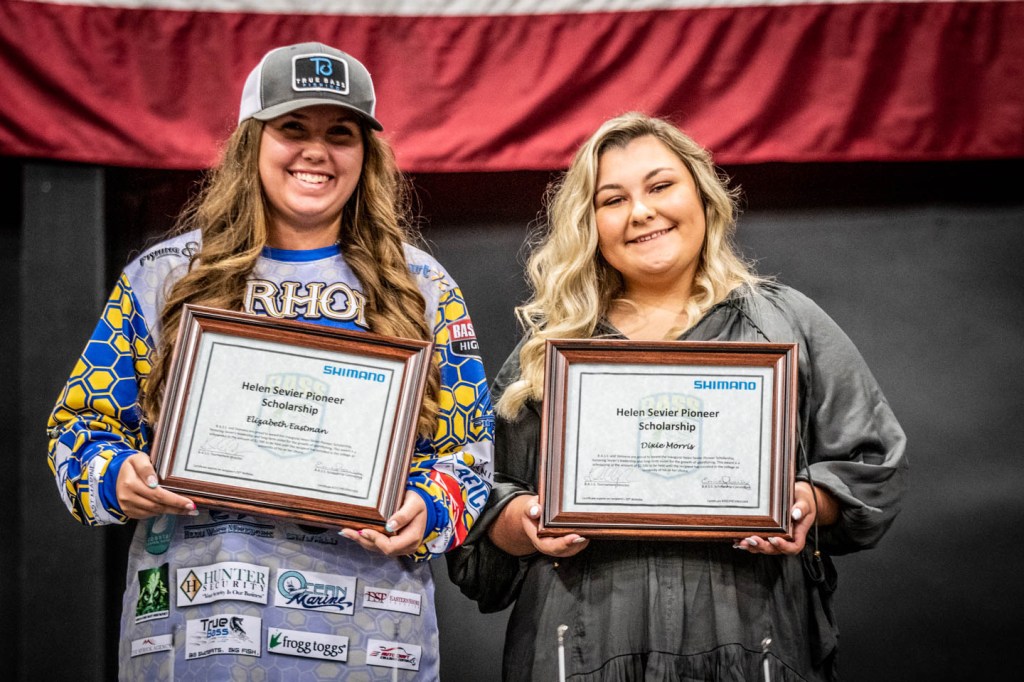
And, there are signs that a wave of lady anglers who could make an impact on the top level of the sport is fast approaching. Fischer is at the height of her powers in the kayak world and is consistently in contention for wins and Angler of the Year title, finishing 10th in the Hobie BOS standings in 2023 and 19th in the Yamaha Rightwaters Bassmaster Kayak Series AOY race sponsored by Dakota Lithium.
She is considering a potential move to the bass boat world to make a run at the Elites in the near future and has fished several Opens as a co-angler to better prepare herself for that jump.
“One of these years I want to try to qualify for the Elites,” she said. “I think I’ll regret not jumping in. The hard thing for me is, in order to spend time in a boat, I have to give up some of the kayak stuff and I love fishing from a kayak. But eventually I will regret not doing it. So, I hope one of these days to buckle down on that.”
“As far as talent, they have it,” Tucker remarked. “They are catching fish and winning tournaments and have passion there. Now that there are a lot more girls in it, a lot of them are feeding off of each other and the passion is growing because they are feeding off of each other.”
In three of the last four Bassmaster High School National Championships, a girl has made the final-day cut, most recently senior Braci Ault from Indiana in 2022.
“As a female angler, there are usually two of us and sometimes it is just me,” Ault said of her local trails. “I really don’t think anything about it because girls can fish too. Just do what you love, that’s what I am doing. It comes pretty easy to me when it is so fun.”
Two years ago at Saginaw Bay, Sarah Swindle and Lainie Holbert became the first girls to win a Junior Series event. They have been regular contenders in the Tennessee B.A.S.S. Nation Youth Division ever since, becoming the first all-female duo to win a statewide high school trail event when they claimed first place Sept. 9 at Nickajack Lake. They also notched a Top 10 in the 2023 Strike King Bassmaster High School Series presented by Academy Sports + Outdoors event on Lay Lake in February.
“It is amazing. Walking across that stage and seeing everyone,” Swindle said after that Saginaw Bay tournament. “And being girls is the best part. You can show that girls can do the same as boys. They are all just staring at you, and we are like, ‘We got fish just like you do.’ It’s awesome.”
In other tournament trails, Fallon Clepper made history as the first female to win the MLF High School National Championship with her partner Wyatt Ford.
Hilary Sue Martin, daughter of Elite Series pro Scott Martin, is making strides in both the tournament world and on the social media side of things. Bradley believes Martin has the correct ingredients to become a pro if she chooses to pursue that path.
Bradley hopes with so many younger ladies making waves in the sport, there will be a serious breakthrough before too long. She added that social media has helped a lot of the female anglers connect and help each other through the hardships of the tournament trail, which can only help in the long run.
“The existence of people like Briana and Anastasia, seeing her on the cover of Bassmaster, was awesome,” Bradley said. “I see the drive and desire and these girls are trying to figure it out. I think social media, with all of its bad, comes with a lot of positives too. Which is, there were a lot of people I met at the Classic and Anastasia organized a meetup with all of the girls there. These were not the daisy duke, fake tan chicks. They were anglers. So, I feel like we are close to (a breakthrough). There is plenty of room in the Opens, Elites and Classic for the female anglers who are serious about it.”

